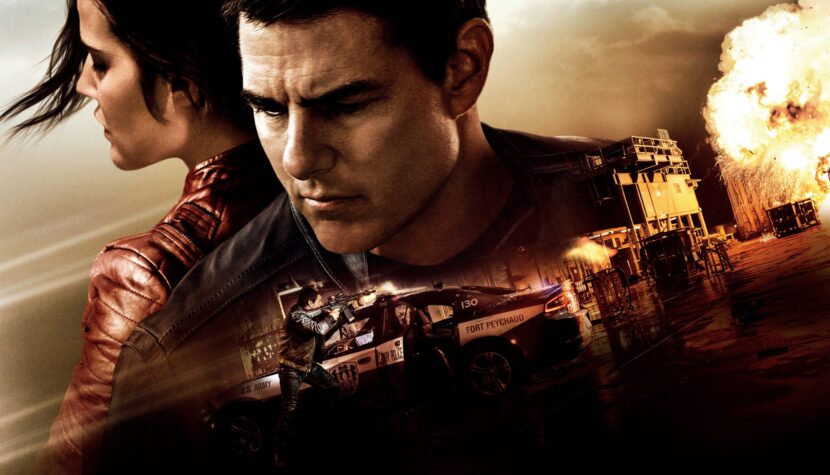JACK REACHER: NEVER GO BACK. Action scenes are not the most important ones

I’ll start by saying that I read Reacher. I have several parts of Lee Child’s book series in my library, and reading them brings me pleasure. Although I believe that Jack Reacher’s adventures often follow a similar pattern (the titular hero accidentally ends up in a small town where evil is spreading, only to ultimately restore order), it’s hard to deny their old-fashioned charm.
Here is the latest just man, respecting the law while standing above it when the situation demands, and his personal code compels him to take action. Child’s stories are an apotheosis of American heroism, a celebration of individualism, and an interesting concept of individual freedom—Reacher, beyond his old military ID and cash, carries nothing else, no credit cards, phone, or house keys. A contemporary nomad, traveling from one end of the United States to the other, uninterested in settling down and putting down roots.
I like this character, although I don’t consider myself one of its fanatic fans who were displeased when it was announced that Tom Cruise would play the powerful Reacher in the film version. But the first adaptation, “One Shot,” made four years ago, did not harm the original book or its hero. Christopher McQuarrie’s good film was characterized by severity and minimalism, abandoning the excesses of modern action cinema, focusing on simplicity of narrative and plot. The director of the sequel, Edward Zwick, is now trying to follow the same path stylistically, although he also wants to see something in the titular hero that he doesn’t really want to be.

In “Never Go Back,” after one of his small-town actions, Reacher goes to Washington to meet Major Susan Turner (Cobie Smulders), the commander of the unit he once led. Jack knows Major Turner only over the phone (the prologue explains the circumstances of their meeting), expects a shared dinner, and maybe something more. However, upon arriving in the capital, it turns out that Turner has been arrested for espionage. Additionally, Reacher receives court documents instructing him to pay overdue alimony, even though the woman filing the lawsuit is unknown to him, and he had no knowledge of any child until now. Soon, along with the fugitive Turner and his alleged daughter, fifteen-year-old Samantha (Danika Yarosh), he sets out on a journey to track down those responsible for framing Major Turner and the death of her soldiers.
I don’t have a problem with filmmakers taking on the eighteenth part of the book series, as the previous film was already an adaptation of one of the novels. It had no impact on the successful start of the on-screen Reacher adventure. However, in the case of “Never Go Back,” one may have doubts about whether it was worth delving into this particular title. Despite the initial setup, the intrigue is sluggish, the antagonist uninteresting, and the resolution exceptionally unsatisfying. Therefore, it’s not surprising that Zwick and two other screenwriters tried to give the whole thing a more cinematic character, abandoning many book episodes in favor of a family melodrama that is practically absent from the novel.
It is evident that the director of historical spectacles (Glory, The Last Samurai) is not particularly interested in sensational plotlines or action scenes, which he stages with diligence but without flair. Therefore, he prefers to focus on the interaction between the three characters, forming something like a dysfunctional family. Dad Jack, Mom Susan, and rebellious daughter Samantha are constantly arguing, struggling to understand each other, but over time, they learn to trust and appreciate each other’s value. This develops very naturally, especially since Reacher cannot deny how much the teenager resembles himself—smart, instinctive, able to handle any situation. He, in turn, reciprocates with pragmatic yet insensitive comments, clearly unsure of how to behave.
His relationships with Major Turner are also not easy. On the one hand, he treats her as an equal, battle-hardened and not helpless, resulting in a great scene where he, shirtless, and she, in just a bra, completely ignore their own sexuality. However, there are moments when Reacher wants to gallantly help Turner in action just because she is a woman, which immediately sparks her objection. Cruise increasingly chooses projects in which his characters clearly fade against their partners—Edge of Tomorrow, Mission Impossible: Rogue Nation, and now Never Go Back are evidence of bidding farewell to the image of a tough man with a woman playing the role of a pleasant eye-candy. Currently, she is not only equally strong but sometimes stronger than the main hero, which contradicts Child’s idea presented in his novels. The filmmakers try to reconcile the two, ultimately giving an unconvincing result—Major Turner can boast physical, intellectual, and determined skills equal to Reacher’s, but in the end, she is helpless without him. Not because Cruise’s character is genuinely superior, but because that’s what the screenwriters want. The airport scene, where Jack solves a riddle based solely on his own imagination, is the best proof of this.
Fortunately, Zwick compensates for the lackluster plot and provides a satisfying conclusion to the family thread with the finale. The chase through the streets of New Orleans during the Halloween parade is well-executed and induces faster heartbeats, as the main character has already adapted to the role of the family head. Perhaps only temporary and not very loving, but in the face of danger, very devoted and capable of rising to the occasion. As a reward, Reacher gets a mobile phone. The book Jack would have thrown it away without a second thought. This cinematic one might keep it.

